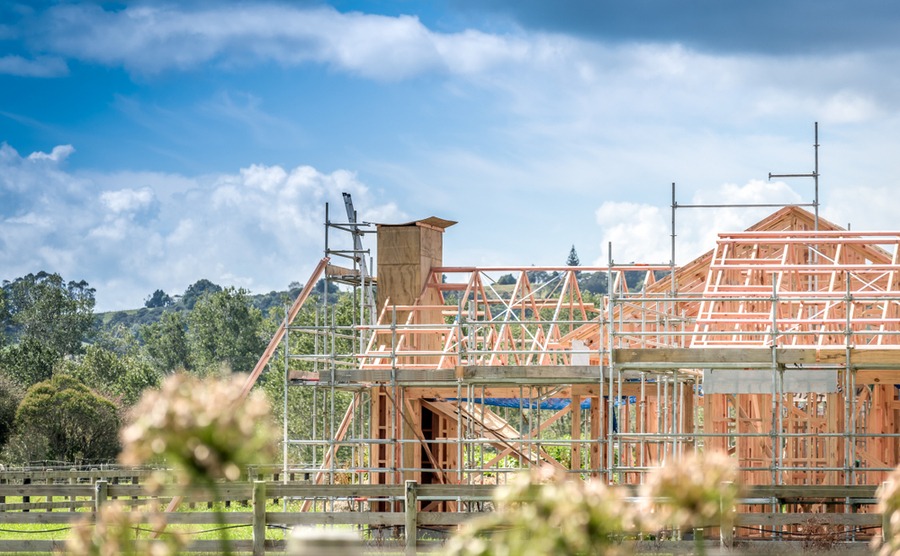Now that you’ve sourced the perfect plot of land and found the architect who is going to bring all your property daydreams to life, there is one final – rather essential – step: finding a builder. In Part three of our series, we’re looking at where to find a decent builder and the steps involved in getting your house built when you move to New Zealand.
Whom do I need to hire, and where do I find them?
The most efficient and stress-free way to get your house built is to hire a building contractor to manage the build and your budget. Even if you have thoroughly researched ‘how do I build a house?’ having a qualified professional on-board who knows every step, potential problem and decent local sub-contractor, will save you a whole lot of legwork.
The best place to find a builder in New Zealand is via a quick search on the website of New Zealand Certified Builders – an organisation launched in 1998 designed to protect people from unqualified builders and unethical practices and to promote excellence in building standards. Simply enter your location in their handy search tool and voila! A list of NZCB-approved builders right before your eyes. Plus, if you source a builder via NZCB they offer a 10-year residential guarantee, which means all building work is covered for a decade. How’s that for peace of mind! Master Builders is another official body offering similar, and they also have a search tool.

Any builder in New Zealand needs to hold a licence.
Anyone you hire to work on your house build needs to be a Licensed Building Practitioner (LBP). You can search the LBP register for whatever kind of tradey you need, and then relax, safe in the knowledge that they have undergone a rigorous vetting process to be included on the list. All tradespeople registered here have to undergo continuous skills maintenance testing every two years. There are a couple of professions that aren’t featured in this list. For registered plumbers and gasfitters, you must consult the Plumbers, Gasfitters and Drainlayers Board, and for Electricians, the Electrical Workers Registration Board.
How do I choose between contractors?
New Zealanders are friendly folk, so how will you possibly pick a favourite contractor? There are a number of ways to identify the prime candidate to take on managing the build of your home. After you’ve established that they hold all the necessary licenses, seek a minimum of three quotes from different contractors. This will help you to secure a competitive price. Meet with each contractor in person so that you can see if you like them, but also to outline the details of your project. In addition to supplying them with architects plans and specifications and information about the plot, they will need to know the following to be able to provide you with the most accurate quote possible:
- Budget
- Goals for the project
- Details of your architect
- Start and end dates
- Their role, i.e. What kind of contract do you want to have with your builder? Is it a full contract? A labour-only contract, or a managed labour-only contract? Each contractor will explain what each type of contract covers, allowing you more or less control depending on how much you want to be involved.
- Payment schedule
- Whether you will be living on-site during the project
- What materials you want to use, if you want something specific.
Always ask the contractor to provide you with a detailed breakdown of the build costs, rather than an estimate.
Always ask the contractor to provide you with a detailed breakdown of the build costs
A thorough quote should include the following:
- A breakdown of labour and materials
- Disposal and cost of work required
- Equipment and scaffolding hire
- Notes on manufactured items that will be required for the build.
- Once you have this selection of quotes back in your hands, you must then compare each quote item by item. Double-check the materials that they have listed to ensure that they are in line with your plans, and that they will give you the desired finished result.
Additionally, it’s important to establish whether or not you like how each contractor operates. Are they efficient at getting back to you? Do you feel as though you can speak freely about any concerns? Can they show you past examples of their work? Can they put you in touch with any references? A good builder will have an abundance of people ready and willing to wax lyrical about their services.
Also, it’s worth giving them a bit of a grilling. Have any of their projects run over schedule and what were the reasons? What type of insurance do they have and how will you be covered by said insurance during the build?
Time to sign the contract?
Once you’ve established a frontrunner, it’s time to get that all important contract signed. This needs to be in writing, and it must contain a list of every single thing the contractor will be involved in over the course of the build, the cost of labour and materials. Always get an independent lawyer to check over this contract for you. If you plan on hiring some of the sub-contractors yourself, rather than leaving absolutely everything in the hands of your builder, remember that you must have a written contract with every single one.
Learn how to get the most out of your budget when doing a self-build with the tips and tricks in our Negotiating Guide.
One point worth noting is that some parts of the build might be tricky to estimate costs for. For example, your contractor might instead include ‘provisional sums’ in the contract. This is as accurate a cost estimate as it is possible for them to make, but of course unexpected problems can arise, water pipes can burst, and additional sums can end up being added to that final bill. If you see provisional sums in your building agreement, discuss exactly what this means with the contractor in question. Often matters like the kitchen, drainage and laying the foundations are quoted as provisional sums.
How long does it take to build a house?
Typically, a house build will take between seven and twelve months. Once you’ve found the plot, sourced all the professionals, signed all the contracts and obtained the required permits, the build should run as follows:
Typically, a house build will take between seven and twelve months.
Steps involved in building your New Zealand property
1 – Site preparation and foundations (one month – but can be as much as three months more if the plot you’re building on is on a slope).
2 – Framing, roofing, windows and utilities (one month to six weeks).
It’s possible to avoid delays at this point by making sure all materials are ordered well in advance and contractors are booked in to complete the work.
3 – Exterior cladding (one to three weeks).
4 – Interior walls, flooring and appliances (three to six weeks).
5 – Electrics and plumbing (one to two weeks).
6 – Finishing touches, i.e. curtains, blinds etc. (one to two weeks).
Finally, you need to have the property inspected by The National Body of Professional Residential Building Inspectors and source the Certificate of Code Compliance from the local body that gave you permission for the build in the first place. This part of the process shouldn’t take more than two weeks.
How can I make sure things go smoothly?
Having a house built can be a stressful process. Unexpected things can occur that might never have been anticipated that delay the project considerably. Even the most rigorous planners experience hold-ups. It’s vital that you communicate effectively with your contractor. If you have all the facts about how the build is proceeding, you don’t have to fret and fuss. Set up regular meetings or calls with your builder so that they can keep you updated on developments and potentials hiccups.
Protect your budget from constantly changing exchange rates reducing its value with your free Property Buyer’s Guide to Currency from our partner Smart Currency Exchange, ranked #1 for money transfer by consumers on Trustpilot.
Additionally, speak up if something isn’t to your liking. Remember, you have worked hard for this house build to be possible. Don’t be too polite to have your say when something doesn’t feel right. You are in charge. You are always well within your rights to change your mind about the smaller elements of the project. However, if plans do get switched up – make sure the change is officially written up rather than just making verbal contracts. It’s also a good idea to keep your eye on the build. Visit the site (at agreed times), see the work that has been done and how they are preparing for the next stage of the build. The more information you have, the calmer you can be about the build. Furthermore, be Captain Diligent with all the paperwork associated with the build. Keep all contracts, receipts, proof of payments, correspondence and insurance certificates together in one place.
Can I go on-site during construction?
You will need to arrange regular visits with your contractor, rather than just expecting to be able to show up any time you like to inspect the work. Building sites are dangerous places. You must respect your contractors experience and follow their protocols for safe site visits.
How much should I budget for construction costs?
According to Building Guide New Zealand, you can expect to budget the following for construction costs:
- Single-level, flat site, 150m2, economical build = $547,500
- Two-level, flat site, 150m2, economical build = $451,250
- Multiple floors, sloping site, 150m2, medium-specification build = $653,750
- Multiple floors, sloping site, 150m2, high-spec build = $962,500







